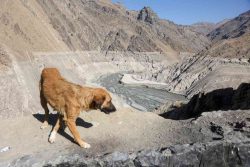13:00 JST, January 26, 2023
PARIS (AFP-Jiji) — The last eight years were the warmest on record even with the cooling influence of a La Nina weather pattern since 2020, the European Union’s climate monitoring service said Jan. 10.
Average temperatures across 2022 — which saw a cascade of unprecedented natural disasters made more likely and deadly by climate change — make it the fifth warmest year since records began in the 19th century, according to the Copernicus Climate Change Service.
Pakistan and northern India were scorched by a two-month spring heatwave with sustained temperatures well above 40 C, followed in Pakistan by flooding that covered a third of the country, affected 33 million people, and caused some $30 billion in damage and economic losses.
France, Britain, Spain and Italy set new average temperature records for 2022, with Europe as a whole enduring its second hottest year ever, Copernicus said in an annual report.
Heatwaves across the continent were compounded by severe drought conditions.
European temperatures have increased by more than twice the global average over the past 30 years, with the region showing the highest rate of increase of any continent on the globe.
“2022 was yet another year of climate extremes across Europe and globally,” said deputy head of the Copernicus climate change service Samantha Burgess in a statement.
“These events highlight that we are already experiencing the devastating consequences of our warming world.”
Large swathes of the Middle East, China, central Asia and northern Africa also saw unprecedented warmth averaged across the whole of 2022.
China and western Europe reported negative impacts on agriculture, river transport and energy management related to weather conditions.
Earth’s polar regions experienced record temperatures last year as well.
The remote Vostok station deep in the interior of East Antarctica reached a relatively balmy minus 17.7 C, the warmest ever measured in its 65-year history.
Antarctic sea ice reached it lowest minimum extent in the 44-year satellite record in February, during the southern hemisphere summer.
At the other end of the globe, Greenland experienced September temperatures 8 C higher than average, accelerating ice sheet loss that has become a major contributor to sea level rise.
The hottest years on record globally so far are — in descending order — 2016, 2020, 2019 and 2017, according to Copernicus.
The atmospheric concentrations of the two main greenhouse gases that drive global warming — carbon dioxide (CO2) and methane (CH4) — also continued a decades-long climb to record levels.
Top Articles in Science & Nature
-

Japan Institute to Use Domestic Commercial Optical Lattice Clock to Set Japan Standard Time
-

iPS Treatments Pass Key Milestone, but Broader Applications Far from Guaranteed
-

Record 700 Startups to Gather at SusHi Tech Tokyo in April; Event Will Center on Themes Like Artificial Intelligence and Robotics
-

iPS Cell Products for Parkinson’s, Heart Disease OK’d for Commercialization by Japan Health Ministry Panel
-

Japan to Ban Use of Power Banks on Airplanes
JN ACCESS RANKING
-

Japan PM Takaichi’s Cabinet Resigns en Masse
-

Japan Institute to Use Domestic Commercial Optical Lattice Clock to Set Japan Standard Time
-

Israeli Ambassador to Japan Speaks about Japan’s Role in the Reconstruction of Gaza
-

Man Infected with Measles Reportedly Dined at Restaurant in Tokyo Station
-

Videos Plagiarized, Reposted with False Subtitles Claiming ‘Ryukyu Belongs to China’; Anti-China False Information Also Posted in Japan
























